Shanxi boasts stable socioeconomic progress

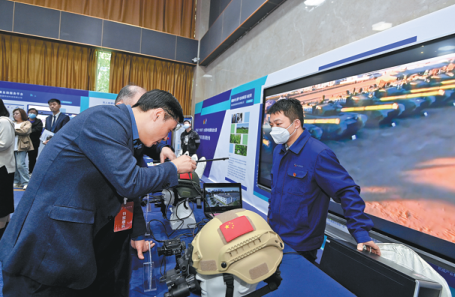
A contest for innovation and entrepreneurship is recently held in the city of Taiyuan. [Photo by Ruan Yang for China Daily]
Province's comprehensive development supported by central authorities' guidelines
Responding to the central authorities' guidelines on high-quality development, the North China province of Shanxi has made all-around progress in various socioeconomic areas in recent years.
Local officials said that breakthroughs have been made in areas including economic transformation, the construction of a comprehensive energy base, optimization of the business environment, and improvements in the ecological environment and people's livelihoods.
In the first three months of this year, Shanxi reported an economic increase higher than the national average, showcasing a strong recovery from the three-year COVID-19 pandemic, officials said.
They added that, with the stable transition from the pandemic prevention and control situation, Shanxi's economic operations started well in the first quarter, showing a trend of resilience and stabilization.
They noted that sticking to the guidelines proposed by China's central authorities is the major reason for the stability of Shanxi's overall socioeconomic development.
The central authorities have made regular tours of Shanxi over recent years, studying the situations of local socioeconomic operations and giving instructions on Shanxi's high-quality growth, especially in the fields of reform and opening-up, economic transformation, rural vitalization, ecological civilization, livelihood improvement, cultural development and governance.
Shanxi's provincial authorities deem that the central authorities' guidelines on development, especially those relating to the new growth patterns and high-quality development, are inspiring and worthy of study by officials, entrepreneurs and people in all walks of life.
The study of the guidelines has led to the formation of implementation measures to boost development and solutions to problems arising from various socioeconomic areas, local officials said.
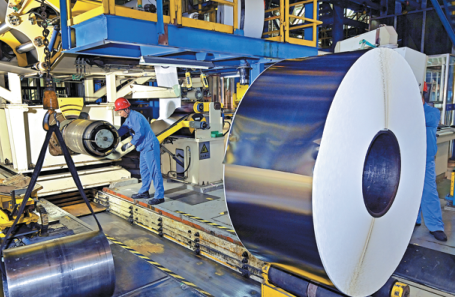
Taiyuan Iron and Steel Group is one of the very few manufacturers in the world that can produce steel foil with a thickness of less than 0.02 millimeters. [Photo by Sun Rongxiang for China Daily]
Transformation
The officials said the central authorities have endorsed Shanxi's practice in economic transformation and noted that innovation is the key.
Shanxi began to implement an economic transformation plan more than a decade ago. The plan required upgrading the traditional industries like coal mining, steelmaking and machinery toward the directions of higher efficiency and cleaner and safer operations. On the other hand, it called for efforts to diversify Shanxi's economic operations by fostering emerging sectors and creating new growth engines.
The plan was approved by the State Council in 2010, and Shanxi became a pilot region for the nation's reform of resource-reliant economies.
Taiyuan Iron and Steel Group, the leading steelmaker in Shanxi, is one example of the successful transformation of a traditional industry.
During their research tours of the company, China's central authorities have been impressed with its cutting-edge products like "hand-torn "steel and encouraged its staff members to continue their efforts in innovation to ensure its successful transformation and sustainable development.
Hand-torn steel is a popular reference to the superthin broadsheet stainless steel foil. With a thickness of less than 0.02 millimeters, or one-third of the diameter of a human hair, the product can be easily torn apart by hand.
According to a company executive, Taiyuan Iron and Steel is among the very few manufacturers in the world that can produce steel foil with such delicacy. It is produced for applications in specific industries including aerospace, electronics, petrochemicals and automobiles.
The company successfully developed the 0.02-mm product variety in 2018, breaking the monopoly of foreign suppliers on the Chinese market.
Taiyuan Iron and Steel continued technological innovation in the years to come, with the latest variety reaching a thickness of 0.015 mm.
"The growing capacity in technological innovation has made it possible for our company to be competitive with more higher-value-added products," a company executive said.
Taiyuan Iron and Steel is at the top of Shanxi's steel industry chain. It is helping to extend the chain through its vigorous development, which has offered ample opportunities for upstream suppliers and downstream manufacturers to grow.
The practice of extending and enhancing industry chains through the spillover effect of the development of leading industry players is Shanxi's new strategy for economic transformation, echoing the guidance of the central authorities.
One initiative in the province is to foster 10 competitive industry chains through backing dozens of leading players in these sectors. Enterprises like Taiyuan Iron and Steel are receiving strong support from the provincial and local authorities for their role in enhancing their corresponding industry chains.
Another move to strengthen industry chains is developing characteristic towns with advantageous local specialty industries.
The government of Shanxi released a list of the first batch of characteristic towns or counties in September 2022. Ten towns and counties were on the list, including Xinghuacun township in Fenyang city for its white liquor; Qingxu county for its matured vinegar; Dingxiang county for its flange products; and Pingyao county for its beef and hand-polished lacquerware.
Shanxi is also vigorously developing the digital economy to offer strong support to the province's economic transformation. It is reported that Shanxi's digital economy has reached a scale of 500 billion yuan ($71.45 billion) in terms of output value.
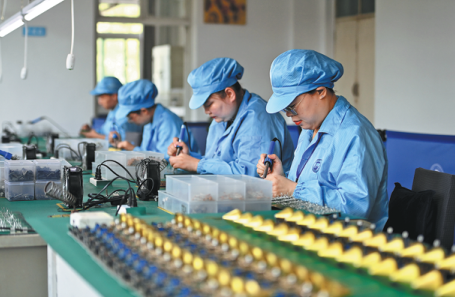
Workers producing components for high-altitude meteorological monitoring equipment at the Taiyuan No 1 Radio Appliances Works. [Photo by Ruan Yang for China Daily]
Energy revolution
Shanxi is one of the leading coal mining regions in China, so central authorities have given Shanxi the double missions of ensuring national energy security and piloting an energy revolution campaign to help the nation realize its sustainability and low-carbon targets.
When it comes to ensuring national energy security, Shanxi produced more than 1.3 billion metric tons of coal in 2022, ranking first in the country. Of that output, about 620 million tons were supplied to 24 provinces, municipalities and autonomous regions other than Shanxi. In addition, Shanxi's coal-fired power plants also supplied a large amount of electricity to the rest of the country.
As a major energy base in China and a pilot zone for energy industry transformation, Shanxi is now implementing an energy revolution campaign, which features the upgrading of traditional coal mining, coking and coal-fired power generation industries and promoting the development of clean, renewable energy resources.
As a result of industrial upgrades driven by digital, intelligent and environmentally friendly technologies, about 80 percent of Shanxi's coal output in 2022 was produced by advanced facilities with cleaner, safer and more efficient operations.
Shanxi is among the country's leaders in the development of new and clean energy resources. Latest statistics show that the province's installed capacity of new-energy power plants reached 49 million kilowatts, accounting for 40.25 percent of Shanxi's total.
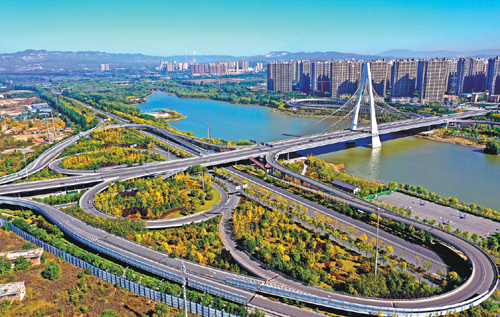
The Fenhe River in Taiyuan is an example of Shanxi's environmental improvement. [Photo by Liu Tong for China Daily]
Demonstration zone
The Shanxi Transformation and Comprehensive Reform Demonstration Zone, located in the cities of Taiyuan and Jinzhong, is the first pilot zone in the country serving Shanxi's transition from a resource-reliant economy. Its role in backing Shanxi's economic transformation has been recognized by the State authorities during their visits.
Established in 2017, the demonstration zone is a major destination for hosting emerging industries and a site to cultivate new growth engines for Shanxi. It has developed such emerging industries as advanced manufacturing, the digital economy, biomedicines, new energy vehicles, electronic information, smart logistics, modern agriculture and environmental protection.
Over the past decade, the zone has also grown into a leading bench mark destination for Shanxi's investment promotion.
This year, the zone has 44 of the largest projects on the provincial list of key investment projects.
It is also a pacesetter in Shanxi's practice of improving the business environment.
The zone has devoted much energy to creating a predictable, reliable and sustainable business environment for enterprises based on the principles of the rule of law and market orientation and according to international standards and practices.
It has implemented a number of measures to streamline business approval procedures, reduce administrative service costs, and improve administrative service efficiency through the use of online platforms and digital technologies, as well as whole-process assistance from officials to help businesses grow.
Its recent pledge to investors is that the period between agreement signing and project construction will be shortened to 58 days, compared with 238 days in the past.
The demonstration zone's many pilot practices have been taken up in other development zones and industrial parks in Shanxi, making them major drivers for local economic growth.
It is reported that Shanxi's 71 zones and parks reported a combined industrial incremental value of 390.62 billion yuan in 2022, growing 14.2 percent from 2021. The amount accounted for 31.5 percent of Shanxi's total industrial incremental value and the growth rate was 6.2 percentage points higher than the provincial average.
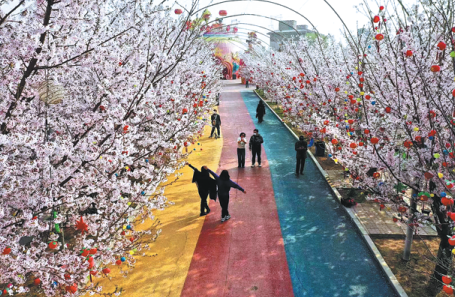
Tourists take pictures under blooming sakura trees during a tourism festival in Taiyuan's Wanbailin district. [Photo by Li Zhaomin for China Daily]
Livelihood improvement
The leaders of Shanxi have put improving people's livelihoods high on their agenda according to the requirements of China's central authorities.
On many occasions when they visited Shanxi, the central authorities called on local officials to stick to a people-centered philosophy of governance and allow residents to enjoy the fruits of development.
Improving the quality of life for rural and urban residents has been highlighted by the Shanxi authorities.
The province has carried out a decadeslong poverty alleviation campaign for its rural residents. Thanks to the targeted measures such as relocating residents from locations with adverse living environments and creating job and business opportunities through developing local characteristic industries, Shanxi announced the elimination of absolute poverty in early 2021.
Since then, Shanxi has entered a new era of rural vitalization, allowing residents to further improve their livelihoods in a sustainable manner.
Latest statistics show that the per capita disposable income of rural residents reached 4,386 yuan in the first quarter of this year, increasing 6.4 percent from the same period of 2022. This growth rate is also 0.3 percentage point higher than the national average.
In both rural and urban areas of Shanxi, people can sense the changes for the better in their lives day by day. The transformations are demonstrated in the areas like broadened coverage of government-sponsored systems of pension, healthcare and unemployment insurance, as well as free compulsory education for children and the improvement of infrastructure.
A sound ecological environment is also crucial to improving the quality of life.
During their visits to Shanxi, the central authorities expressed their expectations for Shanxi to become a more livable place featuring "clear skies, clean waters and lushly vegetated mountains".
According to the requirements of the central authorities, Shanxi has carried out various initiatives to protect its environment. One of the moves is to implement a strategy to become an experimental zone for ecological protection and high-quality development of the Yellow River drainage area since 2017.
Years of efforts has yielded results. In 2022, 82.8 percent of the water bodies of the Yellow River and its tributaries were tested as having good or excellent water quality, according to data collected in 58 monitoring stations across the province. The rate represented an increase of 16.7 percentage points compared with 2021.
In addition to water quality improvement, positive results have been reported in almost all fronts of environmental protection, from curbing pollution from industrial plants and treating rural household sewage to restoring wetland ecology and planting trees on the mountains.
The provincial department of ecology and environment recently said that all the environmental indexes of Shanxi reached the best levels in history in 2022.
MOST POPULAR
- 1 China to continue opening up its mega-market to world: premier
- 2 Policies concerning expats, foreign enterprises in November 2025
- 3 China to enhance convenience for inbound tourism: minister
- 4 Departure tax refund applications surge 285% as inbound tourism rebounds
- 5 China's foreign trade up 3.6% in first 11 months of 2025







